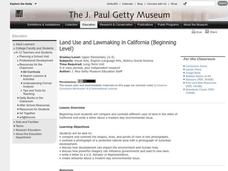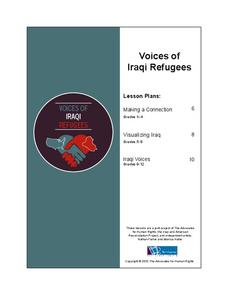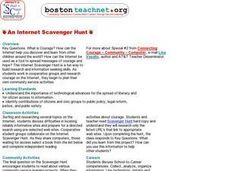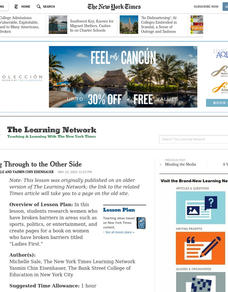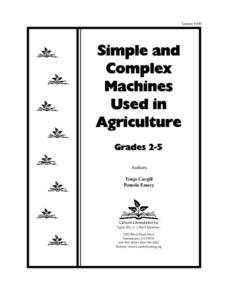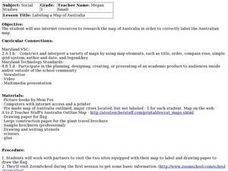Curated OER
Reduce, Reuse, Recycle
Students brainstorm and share opinions about products that can be reused or recycled after reading the article, "Seattle's Recycling Success Is Being Measured in Scraps." They then investigate, analyze and evaluate articles on recycling...
Curated OER
GPS Treasure Hunt for Knowledge
Students examine themselves as being part of a global community. In this global community activity, students investigate GPS systems. Students gain knowledge on how the device works. Students discover that satellites provide information...
Curated OER
Land Use and Lawmaking in California
Students investigate the laws of using land. In this California Government instructional activity, students examine the many uses of land in California and find an environmental issue they care about. Students write a letter...
Curated OER
Where Do You Live?
Students discuss the community in which they live. They take an observation field trip and then use paper and boxes to design and construct a model of their community.
Stanford University
Lesson Plan: Montgomery Bus Boycott
Most of us have heard of Rosa Parks, the Montgomery Bus Boycott, and Martin Luther King, Jr. But what about Claudette Colvin, Virginia Durr, Freedom Summer, or the Birmingham Children's Crusade? A five-lesson unit prompts class...
Advocates for Human Rights
Voices of Iraqi Refugees
The stated goal of this resource is to provide learners with basic facts about and build empathy for Iraqi refugees. To do so elementary classes develop a plan for how to welcome refugees to their classroom. Middle schoolers read...
Curated OER
Smallville Prairie Development Project
Students research the characteristics of the prairie habitat focusing on scientific, social/historical and aesthetic values. They investigate how humans impact the prairie habitat while maintaining a daily journal of research and...
Curated OER
An Internet Scavenger Hunt
Middle schoolers use the internet to gather information about children around the world. In groups, they complete an internet scavenger hunt to research courage. They develop their own community service activity.
Curated OER
Can Anyone Be a Leader?
Students explore the concept of leadership and identify leaders from the past and present. They brainstorm qualities of effective leaders, research a leader from the past and develop a presentation on their findings and choose a local...
Curated OER
Energy Efficient Home Design
Students investigate the applications of energy efficient homes. They conduct Internet research, complete a worksheet, evaluate the energy efficiency of a home design, and complete a research report on energy efficient homes.
Curated OER
Different Strokes
Students explore a Maine community in which a sudden influx of Somali immigrants has resulted in tension between the Somalis and the local residents. They create a handbook explaining aspects of the Somali culture to an American audience.
Curated OER
Do We Have to Do This?
Students conduct Internet research, and read articles about education to determine why particular educational practices are used, and why they are important in terms of No Child Left Behind. Students create PowerPoint presentations...
Curated OER
The Past Is Gone, But Not Forgotten
Students examine the role of historic sites in preserving the past, and use a NY Times article about a preserved 19th century farm as a springboard for discussion about the conservation of other historic sites and research about historic...
Curated OER
Jurassic Park Debate
Students research behavior, phsyiology, and ecology of dinoaurs. Students role-play as scientific specialists such as geneticists and ecologists. They present their research findings in a research paper.
Curated OER
Proof of the Primate-ive Roots of AIDS
Students explore recent breakthroughs in H.I.V. and AIDS research, as well as research various epidemics that have devastated the world population at various points in history.
Curated OER
Presenting the Geologic Timescale
Students model the geologic timescale using distance as a metaphor for time. They write a summary of a major event or fossil organism. and station themselves and their summaries along a path within a gymnasium, and present their...
Curated OER
Exceptional Environmentalist Award
In this environmentalist activity, students work in teams to research people who are environment activists and choose one of them to get the award. Students create a poster to explain their choice of the recipient.
Curated OER
Breaking Through to the Other Side
Ninth graders research women who have broken barriers in areas such as sports, politics, or entertainment, and create pages for a book on women who have broken barriers titled "Ladies First."
Curated OER
Invisible Invaders
Students research various epidemics that have devastated the world population focusing on the historical events taking place during the times of the epidemics and the epidemics' effects on these societies.
Curated OER
Women's Involvement In The Progressive Era
Students participate in a lesson that is investigating the Progressive Era of history. They conduct research focusing on the role of women in era. The information provides the perspectives necessary to address the popular stereotypes...
Curated OER
Sign Language
Learners consider what defines their local town or community and create a welcome sign for their town after learning about a special sign that welcomes visitors to Las Vegas.
Curated OER
Simple and Complex Machines Used In Agriculture
Students explore agriculture and the current technologies and research that continue to make Earth a viable planet. This four lessons unit introduce students to simple machines and the concepts of force and friction through a variety of...
Curated OER
Labeling a Map of Australia
Third graders label a map of Australia. Using the internet, they research the history and maps of the continent and print a blank map. They review on how to use a compass rose and legend. In groups, they create a brochure to share...
Curated OER
Writing about the climate
Young scholars research the contributing factors to the Earth's paleoclimate. They determine the relevant climate data and use it to construct a science argument. In the process, they access data, capture images of the data plots, and...


